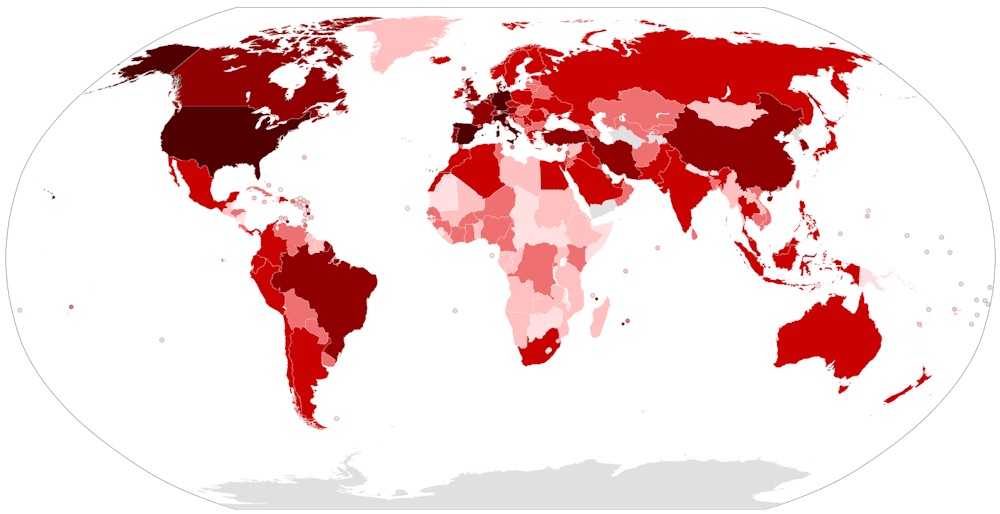In dealing with a public health crisis that has inspired reality checks of all sorts, we are devoted to the notion that this virus changes everything, not just now but forever after. To cope, after all, we must submerge and overcome the worst aspects of ourselves, and recognize that we are all in this together, bigoted tirades and class distinctions notwithstanding.
Idealists assure us that we will live our illuminated, post-virus lives according to a new consciousness, one based on a universal understanding of common interest and boundless empathy, molded in a pit of collective despairing uncertainty.
But recent history tells us this utopian forecast can already be stamped to designate non-starter status. We have, in the course of our panic, seen fit to forfeit the basics. We must remember that the crisis we face is societal, not biological. Its solution lies not in moral principles, but in political struggle.
No doubt, most reading this know to one extent or another the feeling of hunger, how the body responds when it is not provided with food and drink. Yet, hunger is not an issue of human physiology, at least insofar as there now exists the realistic prospect of feeding all. Hunger remains, however, in spite of this technical capacity; it is therefore an issue of social structure, as opposed to the inescapable guarantee of starvation that frequently faced our less fortunate ancestors.
The same principle holds in the case of the virus; certainly, our vulnerability to it is a feature of our biology, but our inability to mobilize an effective response is a product of our social system, rather than an inevitable and immutable part of what it must be like to confront such an opponent. We are brought into conflict not only with a part of nature, but also with the part of our social structure that hinders our efforts on the recognized battlefield, that of medicine.
It has been made tragically obvious that drastic action is required to put the virus in check, and things would have been better if such action were taken sooner. But this incident is not a one-off; issues that have come to light are not products of abrupt formation, but instead are the accentuated iterations of travesties that represent the daily tribulations of many. When Briahna Joy Gray advised on Twitter that we be equally frantic and uncompromising regarding free treatment for cancer and diabetes, as well as for the virus, it became clear that the right lessons have not yet been learned from this crisis.
Instead of marveling at the fact that such a comment was necessary in the first place, detractors elected to denounce her with vicious vulgarities and unhinged threats. This rhetorical deluge, out of place though it may seem directed at someone who exhibited the gall to suggest that we might consider adopting a touch of civilization into our healthcare system, is perfectly consistent with what life was like before the age of the virus. More disturbing still, it represents what life will be like afterwards as well, assuming that steps are not taken decisively to prevent such a grotesque eventuality.
Even among ourselves as part of the Princeton community, it is crucial that we not let such a tumultuous occasion go to waste. Frequently, I have heard students still on campus lament not only the subpar living conditions that they are obliged to deal with, but also the looming menace of possible eviction should rigid regulations not be adhered to, to the very letter. Even now, in other words, it hasn’t been made clear that people still on campus — by great necessity, as the University took care to ensure — don’t stand a chance of being thrown out.

But any objection to eviction that we voice now should not be limited to the current, hopefully brief stint of the virus that has supposedly changed everything. Eviction, like exorbitant medical charges, was horrific beforehand, and it will be so in the aftermath. Will it have a place in our society, or on our campus, when the dust settles? The answer to this question resides in the future which, hardly predetermined, is partly to be of our own making.
Let’s be careful, but firm and unyielding, about how we forge that future; we cannot afford to mess this up. At the international level, the United States continues to impose sanctions on other countries, including Iran and Venezuela, extenuating circumstances notwithstanding. Sustaining these policies not only directly endangers citizens of these countries, but also threatens human life on a global scale, given the fact that the virus does not respect borders.
By making it impossible for entire nations to adequately secure themselves against an unprecedented threat, the American government is causing unnecessary deaths.
On the front of domestic policy, the recent trend to blame Donald Trump’s unique incompetence and malevolence for the inadequate response ignores the fact that Democrats and Republicans alike have gutted public health infrastructure for decades.

As the working class realizes its social power, perhaps we can look forward to a world without sanctions and without want of basic healthcare. And as for our own little academic corner, maybe the voice we have in our educational and living space will extend beyond the pressure of protests and petitions. We won’t be able to pray away our problems or avoid them just by being better people. But while there are those who have an interest counter to our well-being, we might play a role in weakening their death grip on a society that was so ill-prepared for the current crisis.
Braden Flax is a junior from Merrick, N.Y. He can be reached at bflax@princeton.edu.








